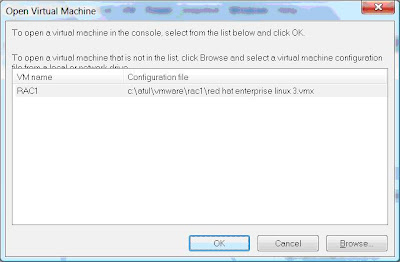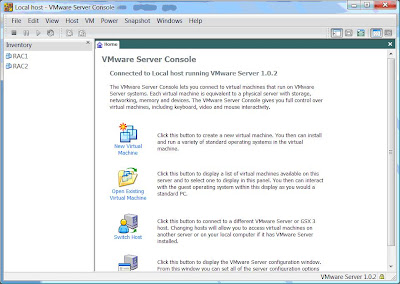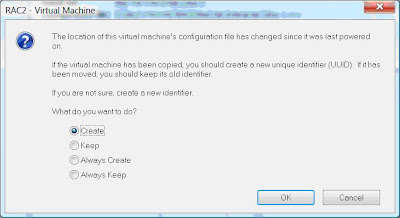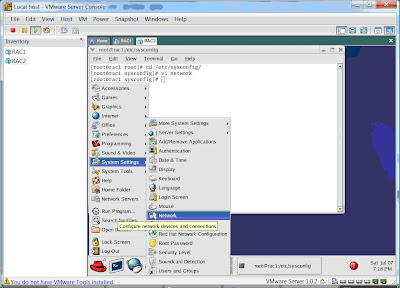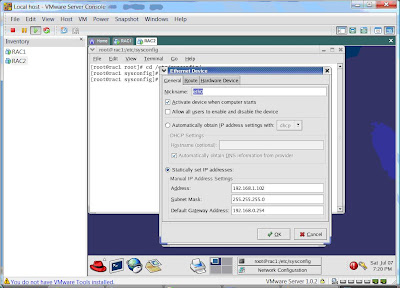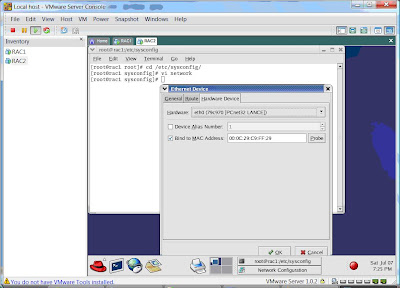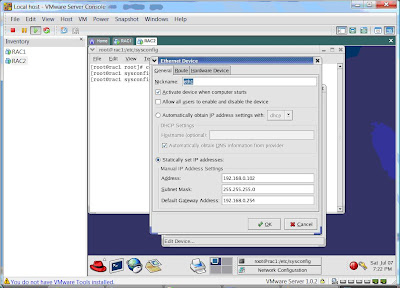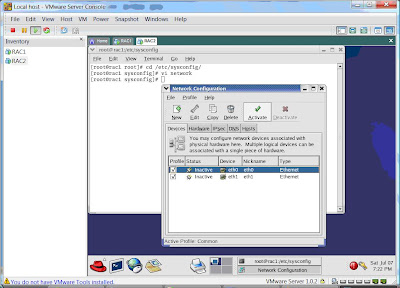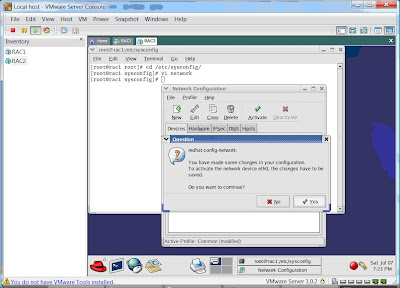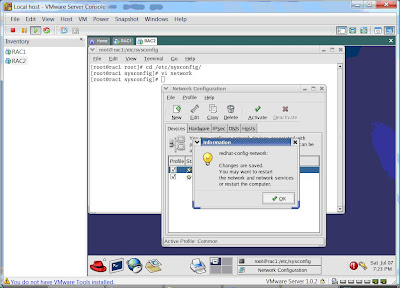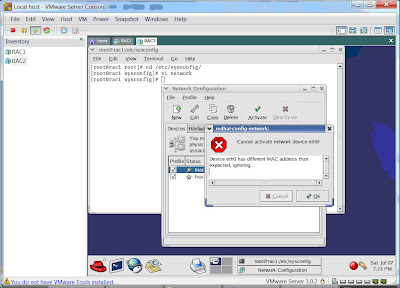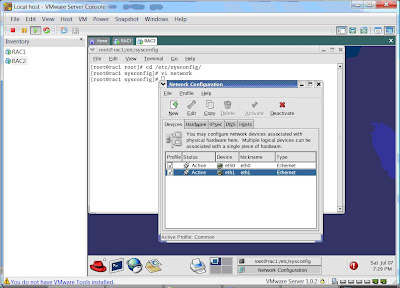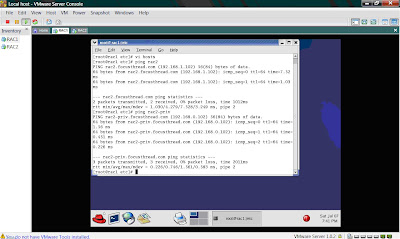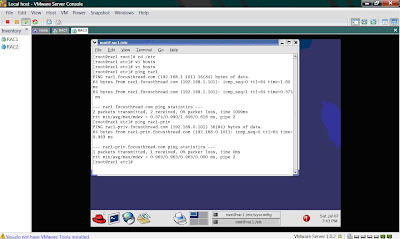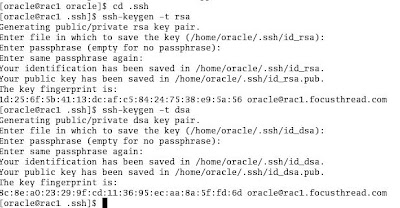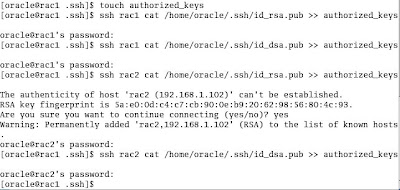Leave a Comment:
22 comments
Great series. I am looking forward to the completion, as I have configured my 2 nodes and am ready for the next step. I am going to take a stab at installing clusterware myself (it has been a while now).
Thanks for the great site.
ReplyHi Steve, I’ll post remaining RAC install parts as soon as I find some time.
ReplyHi … first of thanks for the tremendous ifnormation and so easy setup … my doubt is that i have Oracle 9.0.2 i …. Can i use it as RAC … will it be the same.
ReplySomehow ssh rac2 date and rac1 date are prompting me for password..Stuck there
ReplyHey Guys got the soution .May sound wierd but authorized_keys permission was set to 644 and it worked
ReplyHi,
I shared a folder in windows & vmware machine settings. I could not map it with Linux. How do i do it ? Please help me.
Thanks
Rajan
Rajan,
What r u trying to do ?
Is this related to above doc or something else ?
http://onlineappsdba.com/index.php/2008/09/07/share-filesfolders-from-windows-to-linux-on-vmware/
ReplyManjunath remove the password for ssh since this will speak to one another on RAC through ssh
Replyhi Atul
I am struck at user equivalency…when I am trying to get the date its asking for the password…what to do????
Hi Atul
I am struck at user equivalency…when I am trying to get the date its asking for the password…what to do????
Rgds
Geetha M
Hello Geetha…. please change the chmod setting for .ssh to 700. I resolved the problem
Anil
ReplySSH errors debug routine
Guys i have been getting the passwords for ssh user equivalency.
1. Debug ssh using ssh -v rac1 date
2. Login in as root and stop/start sshd using the following command
/usr/sbin/sshd -dd -e on both rac1 and rac2
3. Login as oracle and it should work.
Good Luck
JET
Hi Atul
Greetings!!
I have started installation of RAC on my laptop.
Post installation of User equivalence, its still asking me for passwords of cluster.
Could you please let me know the possible errors occur at the time of user-equivalence.
Thanks in Advance.
Rgds
DBA
Hi Atul
Greetings!!
Hope you are doing fine with your health. First of all thanks for such a tremendous effort for making us known about installation of RAC on laptop/dektop.
I have started installation of RAC on my desktop and i have done with cloning part but i am facing a problem in user equivalence. While sending authorized_keys from RAC1 to RAC2 it is asking me to type the password, which i did and there i am getting an error as “Permission denied. Please try again later”.
One more thing i want to clarify about that password, are we using a passphrase password which we have giving while configuring the keys??
Could you please let me know the possible errors occur at the time of user-equivalence and which password we have to use while connecting to rac2 from rac1 for sending authorized_keys.
I will be waiting for your reply.
Thanks in Advance.
Regards
Syed
Hi Atul
Greetings!!
Hope you are doing fine with your health. First of all thanks for such a tremendous effort for making us known about installation of RAC on laptop/dektop.
I have started installation of RAC on my desktop and i have done with cloning part but i am facing a problem in user equivalence. While sending authorized_keys from RAC1 to RAC2 it is asking me to type the password, which i did and there i am getting an error as “Permission denied. Please try again later”.
One more thing i want to clarify about that password, are we using a passphrase password which we have giving while configuring the keys??
Could you please let me know the possible errors occur at the time of user-equivalence and which password we have to use while connecting to rac2 from rac1 for sending authorized_keys.
I will be waiting for your reply.
Thanks in Advance.
Regards
Syed
Hi Atul,
I’m doing 10g RAC installation on Oracle enterprise linux using vmware.
I’m trying to do below command from RAC1:
rac1-> ssh rac2 cat ~/.ssh/id_rsa.pub >> ~/.ssh/authorized_keys
receiving below error.
ssh:connect to host rac2 port22: connection refused.
Kindly provide your suggestions to overcome this.
I’m able to ping from rac1 to rac2 and vice versa.
Thanks
Mamta
@ Mamta,
It seems SSH is not installed/running on rac2
as root user on rac2 , check if ssh is listening on port 22
netstat -an | grep 22
If not start SSH
If ssh is listening then check if there is firewall (iptables) between rac1 and rac2
on RAC2
service iptables status
ReplyThanks Atul..
I have installed RAC now.But have a new issue.
After installation I have checked crs_stat -t in rac1 and everything was showing online.
But after rebooting rac1 and rac2.When I do it get the below result.
rac1-> crs_stat -t
Name Type Target State Host
————————————————————
ora.devdb.db application ONLINE ONLINE rac2
ora….b1.inst application ONLINE ONLINE rac1
ora….b2.inst application ONLINE OFFLINE
ora….SM1.asm application ONLINE ONLINE rac1
ora….C1.lsnr application ONLINE UNKNOWN rac1
ora.rac1.gsd application ONLINE UNKNOWN rac1
ora.rac1.ons application ONLINE ONLINE rac1
ora.rac1.vip application ONLINE ONLINE rac1
ora….SM2.asm application ONLINE UNKNOWN rac2
ora….C2.lsnr application ONLINE UNKNOWN rac2
ora.rac2.gsd application ONLINE UNKNOWN rac2
ora.rac2.ons application ONLINE UNKNOWN rac2
ora.rac2.vip application ONLINE ONLINE rac2
rac1-> srvctl status nodeapps -n rac1
VIP is running on node: rac1
GSD is not running on node: rac1
Listener is not running on node: rac1
ONS daemon is running on node: rac1
rac1-> srvctl status nodeapps -n rac2
VIP is running on node: rac2
GSD is not running on node: rac2
Listener is not running on node: rac2
ONS daemon is not running on node: rac2
rac1-> srvctl status asm -n rac1
ASM instance +ASM1 is running on node rac1.
rac1-> srvctl status asm -n rac2
ASM instance +ASM2 is not running on node rac2.
rac1-> srvctl status database -d devdb
Instance devdb1 is running on node rac1
Instance devdb2 is not running on node rac2
when I tried manually up the database in rac2 I receive below error:
SQL> startup
ORA-01078: failure in processing system parameters
ORA-01565: error in identifying file ‘+DG1/devdb/spfiledevdb.ora’
ORA-17503: ksfdopn:2 Failed to open file +DG1/devdb/spfiledevdb.or
ORA-15077: could not locate ASM instance serving a required diskgroup.
I’m new RAC please suggest me what needs to be done.
Thanks,
Mamta
@ Mamta
It seems either your ASM instance is not running or RAC database is unable to find startup file (spfile) which is on ASM Disk Group DB1
1) If ASM is down start it , check this link on how to start ASM instance
http://download.oracle.com/docs/cd/B19306_01/server.102/b14231/storeman.htm#i1013975
2) If ASM is up then check Disk assigned to disk group (ensure that you connect to ASM instance)
SQL> select name, header_status, path from v$asm_disk;
Hi Atul..
Thanks for your prompt response..ASM was not up on rac2.
now everything is fine…
ReplyHi Manjunath,
Thanks for the suggestion.
I was facing same problem of ssh asking for password. But after I changed the permission of authorized_keys to 644, it worked fine without asking for password.
Thanks,
Vineet


